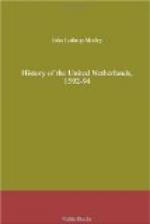The Spaniard, the priest; and the League, had heated the furnace. The iron was at a white heat. Now was the time to strike. Secretary of State Revol Gaspar de Schomberg, Jacques Auguste de Thou, the eminent historian, and other influential personages urged the king to give to the great question the only possible solution.
Said the king with much meekness, “If I am in error, let those who attack me with so much fury instruct me, and show me the way of salvation. I hate those who act against their conscience. I pardon all those who are inspired by truly religious motives, and I am ready to receive all into favour whom the love of peace, not the chagrin of ill-will, has disgusted with the war.”
There was a great meeting of Leaguers at the Louvre, to listen to Mayenne, the cardinal-legate, Cardinal Pelleve, the Duke of Guise, and other chieftains. The Duke of Feria made a long speech in Latin, setting forth the Spanish policy, veiled as usual, but already sufficiently well known, and assuring the assembly that the King of Spain desired nothing so much as the peace of France and of all the world, together with the supremacy of the Roman Church. Whether these objects could best be attained by the election of Philip or of his daughter, as sovereign, with the Archduke Ernest as king-consort, or with perhaps the Duke of Guise or some other eligible husband, were fair subjects for discussion. No selfish motive influenced the king, and he placed all his wealth and all his armies at the disposal of the League to carry out these great projects.
Then there was a conference at Surene between the chiefs the League and the “political” leaders; the Archbishop of Lyons, the cardinal-legate, Villars, Admiral of France and defender of Rouen, Belin, Governor of Paris, President Jeannin, and others upon one side; upon the other, the Archbishop of Bourges, Bellievre, Schomberg, Revol, and De Thou.
The Archbishop of Lyons said that their party would do nothing either to frustrate or to support the mission of Pisani, and that the pope would, as ever, do all that could be done to maintain the interests of the true religion.
The Archbishop of Bourges, knowing well the meaning of such fine phrases, replied that he had much respect for the holy father, but that popes had now, become the slaves and tools of the King of Spain, who, because he was powerful, held them subject to his caprice.
At an adjourned meeting at the same place, the Archbishop of Lyons said that all questions had been asked and answered. All now depended on the pope, whom the League would always obey. If the pope would accept the reconciliation of the Prince of Bearne it was well. He, hoped that his conversion would be sincere.
The political archbishop (of Bourges) replied to the League’s archbishop, that there was no time for delays, and for journeys by land and sea to Rome. The least obstruction might prove fatal to both parties. Let the Leaguers now show that the serenity of their faces was but the mirror of their minds.




